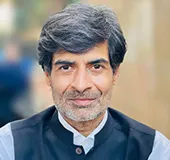India is one of the biggest beneficiaries of the IT and communications revolution with roughly 25% of India’s GDP growth over the past two decades having been created in the IT and ITES sector. There is little doubt that a larger share of India’s future growth will originate from or be dependent on this digital medium. Therefore, India must be at the Internet governance high table when agreement is reached on managing this most vital global commons. Would India shed the reticence, characteristic of its 20th century approach to multilateralism and re-imagine itself as part of the ‘global management’ with attendant responsibility and rights? Or will the perceived virtuosity of nonalignment continue to see India lead the global outliers and minority stakeholders in this global governance debate? The chapters in this volume does not offer all the answers, but it does raise a series of questions and provides analysis that will allow us all to engage more deeply with this most important element of our contemporary lives.
Contents
- The Problem | Samir Saran
- A New Paradigm for Cyber Security | R. Swaminathan
- Secrecy, Transparency and Secrecy | Peter Grabosky
- Ensuring Privacy in a Regime of Surveillance | Mahima Kaul
- A Superpower for an Information Society | Sandro Gaycken
- Indo-US Cyber Security Cooperation | Jennifer McArdle and Michael Cheetham
- The Civilian Sector | Gabi Siboni
- Lessons from Russia | Oleg Demidov
- Global and National Security Imperatives | Rajeswari Pillai Rajagopalan
- Negotiating Cyber Rules | C. Raja Mohan
- Further Reading | Darshana M. Baruah
- Labour — Blessing or a Curse? | Mithun Dey
The views expressed above belong to the author(s). ORF research and analyses now available on Telegram! Click here to access our curated content — blogs, longforms and interviews.

 PDF Download
PDF Download



 PREV
PREV


